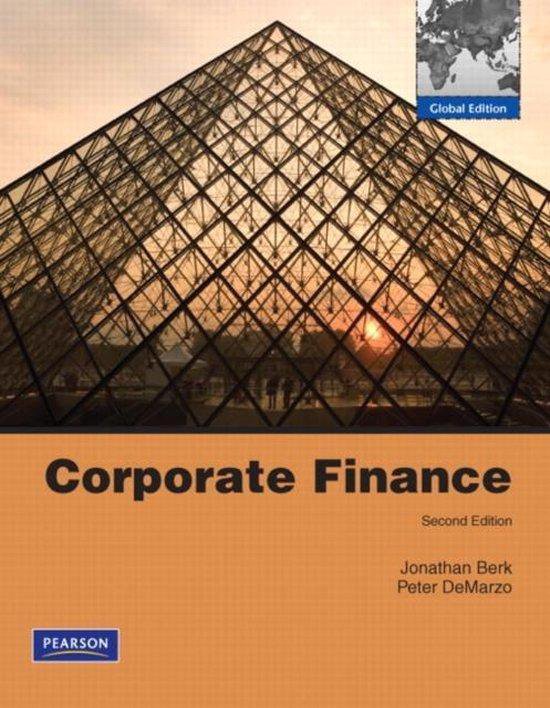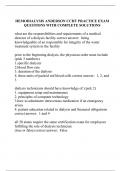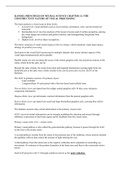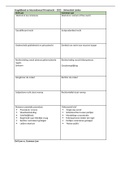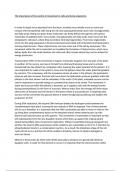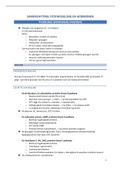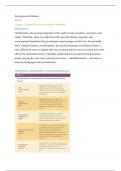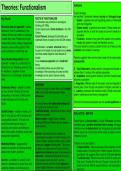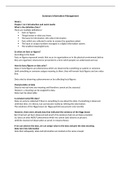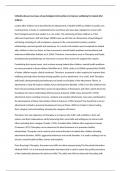Finance II – Samenvatting
Week 1- Capital structure
- Capital Structure: The relative proportions of debt, equity, and other securities that a firm
has outstanding.
- Leverage: debt to equity ratio
- NPV = -investment + (gemiddelde uitbetaling: 1+r)
- PV = market value of firm’s equity = gemiddelde uitbetaling : 1 +r
- Unlevered Equity = Equity in a firm with no debt (equal to those of project because no
debt)
- Expected return = 0,5 x good economy + 0,5 x bad economy
- Levered Equity = Equity in a firm that also has debt outstanding.
- The Law of One Price implies that leverage will not affect the total value of the firm.
Effect of leverage on risk en return
- Leverage increases the risk of the equity of a firm.
- Investors in levered equity will require a higher return to compensate for its increased risk.
-
Miller and Modigliani
- With perfect capital markets, the total value of a firm should NOT depend on its capital
structure.
- They reasoned that the firm’s total cash flows should equal the cash flows of the project,
and therefore have the same present value
- In a perfect capital market, the total value of a firm is equal to the market value of the
total cash flows generated by its assets and is not affected by its choice of capital
structure.
- The total market value of the firm’s securities is equal to the market value of its assets,
whether the firm is unlevered or levered.
- E+D=U=A
, - The cost of capital of levered equity is equal to the cost of capital of unlevered equity plus
a premium that is proportional to the market value debt-equity ratio.
-
-
-
- The effect of leverage on the risk of a firm’s securities can also be expressed in terms of
beta: Unlevered beta -A measure of the risk of a firm as if it did not have leverage, which is
equivalent to the beta of the firm’s assets.
- Leverage amplifies the market risk of a firm’s assets, βU, raising the market risk of its
equity. The firm’s equity beta also increases with leverage:
Homemade Leverage - investors use leverage in their own portfolios to adjust the leverage choice
made by the firm (kijken naar hun debt equity ratio en wat jij wilt zie opdrachten)
Market Value Balance Sheet = a balance sheet where all assets and liabilities of the firm are
included (even intangible assets such as reputation, brand name, or human capital that are missing
from a standard accounting balance sheet).
Week 1- Debt and Taxes
The interest tax deduction
- Corporations pay taxes on their profits after interest payments are deducted. This creates
an incentive to use debt.
- Interest Tax Shield = Corporate Tax Rate x Interest Payments
- The benefit of leverage for the value of the firm is computed as the present value of the
stream of future interest tax shields the firm will receive
- VL = VU + PV (Interest TaxShield)
- With permanent debt = pv tax shield = Tc x D
-
- Effective tax advantage of debt =
- Uses of debt varies by industy, growth industries little debt, airlines high debt
- With no leverage no tax benefit
- The optimal level of leverage from a tax saving perspective is the level such that interest
equals EBIT (but unlikely to predict)
-
Week 1- Capital structure
- Capital Structure: The relative proportions of debt, equity, and other securities that a firm
has outstanding.
- Leverage: debt to equity ratio
- NPV = -investment + (gemiddelde uitbetaling: 1+r)
- PV = market value of firm’s equity = gemiddelde uitbetaling : 1 +r
- Unlevered Equity = Equity in a firm with no debt (equal to those of project because no
debt)
- Expected return = 0,5 x good economy + 0,5 x bad economy
- Levered Equity = Equity in a firm that also has debt outstanding.
- The Law of One Price implies that leverage will not affect the total value of the firm.
Effect of leverage on risk en return
- Leverage increases the risk of the equity of a firm.
- Investors in levered equity will require a higher return to compensate for its increased risk.
-
Miller and Modigliani
- With perfect capital markets, the total value of a firm should NOT depend on its capital
structure.
- They reasoned that the firm’s total cash flows should equal the cash flows of the project,
and therefore have the same present value
- In a perfect capital market, the total value of a firm is equal to the market value of the
total cash flows generated by its assets and is not affected by its choice of capital
structure.
- The total market value of the firm’s securities is equal to the market value of its assets,
whether the firm is unlevered or levered.
- E+D=U=A
, - The cost of capital of levered equity is equal to the cost of capital of unlevered equity plus
a premium that is proportional to the market value debt-equity ratio.
-
-
-
- The effect of leverage on the risk of a firm’s securities can also be expressed in terms of
beta: Unlevered beta -A measure of the risk of a firm as if it did not have leverage, which is
equivalent to the beta of the firm’s assets.
- Leverage amplifies the market risk of a firm’s assets, βU, raising the market risk of its
equity. The firm’s equity beta also increases with leverage:
Homemade Leverage - investors use leverage in their own portfolios to adjust the leverage choice
made by the firm (kijken naar hun debt equity ratio en wat jij wilt zie opdrachten)
Market Value Balance Sheet = a balance sheet where all assets and liabilities of the firm are
included (even intangible assets such as reputation, brand name, or human capital that are missing
from a standard accounting balance sheet).
Week 1- Debt and Taxes
The interest tax deduction
- Corporations pay taxes on their profits after interest payments are deducted. This creates
an incentive to use debt.
- Interest Tax Shield = Corporate Tax Rate x Interest Payments
- The benefit of leverage for the value of the firm is computed as the present value of the
stream of future interest tax shields the firm will receive
- VL = VU + PV (Interest TaxShield)
- With permanent debt = pv tax shield = Tc x D
-
- Effective tax advantage of debt =
- Uses of debt varies by industy, growth industries little debt, airlines high debt
- With no leverage no tax benefit
- The optimal level of leverage from a tax saving perspective is the level such that interest
equals EBIT (but unlikely to predict)
-

